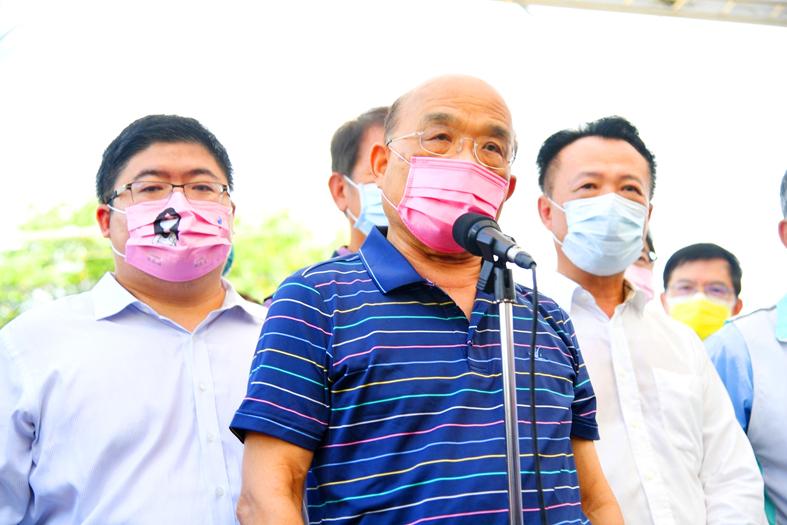Taiwan would not collapse like Afghanistan in the event of an attack, Premier Su Tseng-chang (蘇貞昌) said yesterday, offering an indirect warning to China not to be “deluded” into thinking it could take Taiwan.
China has been ramping up military and diplomatic pressure to force Taipei into accepting Chinese sovereignty, causing concern in Washington and other Western capitals.
The defeat of the Afghan government after the withdrawal of US forces and flight of Afghan President Ashraf Ghani has sparked discussion in Taiwan about what would happen in the event of a Chinese invasion, and whether the US would help defend Taiwan.

Photo: CNA
Asked whether the president or premier would flee if “the enemy was at the gates” like in Afghanistan, Su said people had feared neither arrest nor death when Taiwan was a dictatorship under martial law.
“Today, there are powerful countries that want to swallow up Taiwan using force, and likewise we are also not afraid of being killed or imprisoned,” he said. “We must guard this country and this land, and not be like certain people who always talk up the enemy’s prestige and talk down our resolve.”
What happened in Afghanistan showed that if a country is in internal chaos, no outside help would make a difference, and Taiwanese have to believe in their land and that they can defend it, Su added.
Everyone working together to rapidly bring under control a recent domestic spike in COVID-19 infections showed what can be achieved when Taiwan is united, he said.
“We also tell foreign forces who want to invade and grab Taiwan — don’t be deluded,” Su added, apparently referring to China.
In related news, Taiwan’s two largest airlines yesterday said that flights to and from Europe would circumvent the airspace in Afghanistan.
China Airlines Ltd (中華航空) said that all cargo and passenger flights to and from Europe would fly through Siberia or other alternative routes after bypassing the airspace in Afghanistan.
EVA Airways Corp (長榮航空) said it would enforce the same air safety policy, which would affect all of its flights to and from Amsterdam, London, Vienna and Paris.
Airlines in recent years have bypassed airspace above war zones and politically unstable nations following a couple of major aviation incidents.
On July 17, 2014, Malaysia Airlines Flight 17 from Amsterdam to Kuala Lumpur was shot down by a ground-to-air missile while flying over eastern Ukraine, killing 298 people aboard.
On Jan. 8 last year, Ukraine International Airlines Flight 752 from Tehran to Kiev was hit by two missiles fired by the Iranian Islamic Revolutionary Guards shortly after takeoff from Tehran Imam Khomeini International Airport. All 167 passengers and eight crew members died.
Additional reporting by Shelley Shan

AIR SUPPORT: The Ministry of National Defense thanked the US for the delivery, adding that it was an indicator of the White House’s commitment to the Taiwan Relations Act Deputy Minister of National Defense Po Horng-huei (柏鴻輝) and Representative to the US Alexander Yui on Friday attended a delivery ceremony for the first of Taiwan’s long-awaited 66 F-16C/D Block 70 jets at a Lockheed Martin Corp factory in Greenville, South Carolina. “We are so proud to be the global home of the F-16 and to support Taiwan’s air defense capabilities,” US Representative William Timmons wrote on X, alongside a photograph of Taiwanese and US officials at the event. The F-16C/D Block 70 jets Taiwan ordered have the same capabilities as aircraft that had been upgraded to F-16Vs. The batch of Lockheed Martin

GRIDLOCK: The National Fire Agency’s Special Search and Rescue team is on standby to travel to the countries to help out with the rescue effort A powerful earthquake rocked Myanmar and neighboring Thailand yesterday, killing at least three people in Bangkok and burying dozens when a high-rise building under construction collapsed. Footage shared on social media from Myanmar’s second-largest city showed widespread destruction, raising fears that many were trapped under the rubble or killed. The magnitude 7.7 earthquake, with an epicenter near Mandalay in Myanmar, struck at midday and was followed by a strong magnitude 6.4 aftershock. The extent of death, injury and destruction — especially in Myanmar, which is embroiled in a civil war and where information is tightly controlled at the best of times —

Taiwan was ranked the fourth-safest country in the world with a score of 82.9, trailing only Andorra, the United Arab Emirates and Qatar in Numbeo’s Safety Index by Country report. Taiwan’s score improved by 0.1 points compared with last year’s mid-year report, which had Taiwan fourth with a score of 82.8. However, both scores were lower than in last year’s first review, when Taiwan scored 83.3, and are a long way from when Taiwan was named the second-safest country in the world in 2021, scoring 84.8. Taiwan ranked higher than Singapore in ninth with a score of 77.4 and Japan in 10th with

SECURITY RISK: If there is a conflict between China and Taiwan, ‘there would likely be significant consequences to global economic and security interests,’ it said China remains the top military and cyber threat to the US and continues to make progress on capabilities to seize Taiwan, a report by US intelligence agencies said on Tuesday. The report provides an overview of the “collective insights” of top US intelligence agencies about the security threats to the US posed by foreign nations and criminal organizations. In its Annual Threat Assessment, the agencies divided threats facing the US into two broad categories, “nonstate transnational criminals and terrorists” and “major state actors,” with China, Russia, Iran and North Korea named. Of those countries, “China presents the most comprehensive and robust military threat